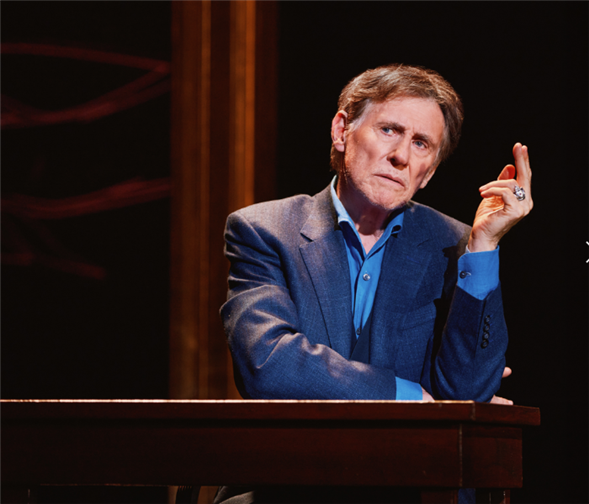Translate Page

The two-time Tony nominee talks about bringing his memoir Walking with Ghosts to New York
---
Gabriel Byrne isn't exactly sure how many characters he's currently playing on Broadway. In his one-man theatrical memoir Walking with Ghosts, running through November 20 at the Music Box Theatre, he channels dozens of people from his past, including his parents, priests and acting icon Richard Burton. Yet despite his success—over the past four decades he's appeared in more than 80 movies and been nominated for two Tony Awards and a pair of Emmys—this is not a typical celebrity solo show. There's no gossip from film sets and little name-dropping. Instead, Byrne reflects thoughtfully on his Irish upbringing, surviving tragedy, achieving sobriety and the passage of time.
Adapted from Byrne's 2022 book of the same name and directed by Lonny Price, Walking with Ghosts arrives on Broadway following runs at Dublin's Gaiety Theatre, the Edinburgh International Festival and on London's West End. Beginning with his childhood in Dublin, Byrne shares stories of his large family (he has six siblings) and his Catholic education. Memories of his first forays into acting are blended with tales of youthful folly.
Byrne doesn't romanticize his life; triumph and trauma get equal treatment. His exhilarating day at the Guinness Brewery bicentennial in 1959 is followed by the pain of corporal punishment at school. There are even moments that inspire tears and laughter simultaneously thanks to Byrne's wry sense of humor.
"It's been such a deeply fulfilling part of the experience to be able to witness people really listening, because listening is very profound," Byrne says. "I'm proud of the writing that allows people that intimacy with me on stage."
On the night I attended, the audience sat dumbstruck as he talked about being molested by a priest while attending seminary school. Byrne first began discussing the abuse a decade ago; when recalling the event, he describes that night as having been "concreted over" in his mind.
Telling a story like that night after night takes an emotional toll, but Byrne says he has learned to cope and hopes his candidness aids others.
"I wanted to use my life to speak for people who don't have a voice," he says. "When talking about grief and abuse and so forth, I always imagine that there's somebody out there who hasn't yet spoken to anybody about those things. If they see me stand up and say, 'Well, look, this is my story,' that might help them in some way to address the issues in their own lives."
Although the show has a contemplative tone, it frequently incorporates comedy. Combining the two is inevitable, Byrne says, especially when he talks about religion, like his short-lived childhood belief that the Holy Spirit came to Earth in the form of a pigeon.
"I feel that even in the most serious incidents, there's some element of comedy, and in comedy there's some element of tragedy," he says. "To look back at Catholicism, for example, which was a deadly serious subject when I was a kid in Ireland, some of those things were absolutely ludicrous. From my point of view, it's right that I should try to make fun of those things because they inspired such fear in me as a child."
Walking with Ghosts is Byrne's second memoir, following 2002's Pictures in My Head, but this is his first time performing his own words on stage. All of his previous Broadway roles, in A Moon for the Misbegotten, A Touch of the Poet and Long Day's Journey Into Night, were written by Eugene O'Neill.
It's also his first solo outing and he loves connecting with theatregoers with no fourth wall in between. "There are two actors in the play: There's me on the stage, and then there's the audience," Byrne says. "They're receiving and absorbing and, in their way, answering, because when you listen to the laughter and you listen to the silence that descends in certain moments, that's pretty powerful. Storytelling is the most ancient form of communication between the listener and the teller. The authenticity of one person on stage telling a story goes back centuries. Being in front of a camera and talking about something is a very, very different form of expression. When you're in the theatre, you retain the audience's interest through drama."
Thankfully, Byrne has led a very dramatic life—on stage and off.
---
TDF MEMBERS: At press time, discount tickets were available for Gabriel Byrne: Walking with Ghosts. Go here to browse all theatre, dance and music offers.
Carey Purcell writes about pop culture and politics for Vanity Fair, Politico and other publications, and blogs at CareyPurcell.com. She recently published her first book: From Aphra Behn to Fun Home: A Cultural History of Feminist Theater.
Top image: Gabriel Byrne in his one-man theatrical memoir Walking with Ghosts. Photo by Emilio Madrid.